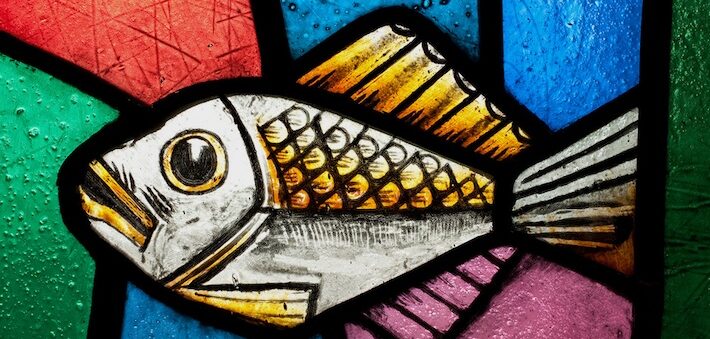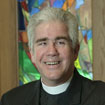Commentary on John 6:1-21
Students who have studied John’s Gospel with me, and especially my teaching partner Barbara Rossing, will be shocked that I am cautioning preachers not to move too quickly to the Eucharist on these Sundays devoted to “the bread of life.”
Jesus has much to say to us about himself before we speak of the Lord’s Supper. Perhaps Jesus desires us to be aware of who he is before we receive him into ourselves. I am not thinking here of any doctrinal formula as much as a terrifying appreciation that in Jesus we are in the very presence of God.
“The Passover, the festival of the Jews was near” (John 6:4), and I imagine the minds of the large crowd following Jesus were at some level occupied with Moses. Jesus plays on the crowds’ — and our — preoccupation for all that it is worth. As a crowd followed Moses, so a crowd follows Jesus; both crowds follow because of the signs they have seen. It’s interesting that, while Moses prophesied plagues, Jesus produced abundance and healing.
And while “the other side of the Sea of Galilee, also called the Sea of Tiberius” (John 6:1) is a vague and undefined description, hard to pinpoint on a GPS, this very vagueness and lack of definition makes me think of the wilderness. So we have a crowd following a leader through the wilderness. We have the Exodus unfolding. And just like Moses, “Jesus went up the mountain” (v.3). Jesus adopts a position parallel to Moses.
As in the Exodus, God and God’s will are about to be revealed. This chapter is not as much about bread, even the bread of Holy Communion, as it is about who Jesus is. And John uses Moses as a reference point for this revelation. Herein lies the homiletic challenge. This reading from John’s Gospel demonstrates that Jesus is mightier than Moses. That’s quite a claim! How do we as Christian preachers make this claim in a way that means something to our hearers without disrespecting, denigrating, and diminishing Moses?
Perhaps the best way of proclaiming the greatness of Jesus is by recalling the greatness of Moses. Moses spoke mouth-to-mouth with the Almighty. Moses received God’s Name and saw God’s behind. Moses brought Israel out of Egypt and across the Red Sea, received the Ten Commandments on Mt. Sinai, and led the people through the wilderness to the Land of Promise. Then preachers might ponder who would be a Moses figure both for themselves and for their hearers. With an appreciation of who the biblical Moses is and an understanding of who a Moses figure might be for us, we can begin to grasp that, for Jesus to adopt a position parallel to Moses is to make a very large claim indeed. And in John’s hands, this is what Jesus does.
Like Moses, Jesus fed the multitude in the wilderness — with one important difference. When Moses asked God, “Where am I to get meat to give to all this people? For they come weeping to me and say, ‘Give us meat to eat!’” (Numbers 11:13), Moses genuinely wanted to know. By contrast, when Jesus asked Philip, “Where are we to buy bread for these people to eat?” (John 6:5), Jesus’ question is rhetorical; “he himself knew what he was going to do” (v. 6). Moses needed God to provide the people with food; Jesus knew he would provide it.
John claims Jesus is testing Philip. Do you suppose Philip recalled that God rained bread from heaven, and each day the people were to gather enough for that day, and in this way God tested them, whether they would follow God’s instruction or not? (See Exodus 16:4) If Philip knew he was being tested, Philip nevertheless failed the test. Jesus asks, “Where are we to buy bread for these people to eat?” And Philip answers in terms of the enormous amount of bread it would take to feed them (John 6:7). Andrew sees only the scantiness of their supplies (vv. 8-9). I cannot help but think of the church’s tendency to respond to Jesus and the needs of the people in terms of the amount of money it would take and the scarce resources that we possess. I am mindful that, if Jesus is testing us, and even when we know it, how often we nevertheless fail the test.
But Jesus feeds the people. Indeed, that “Jesus took the loaves, and when he had given thanks, he distributed them to those who were seated” (John 6:11) certainly has Eucharistic overtones. But we are not yet talking about bread. We are still talking about who Jesus is. Perhaps this is the reason I have always been intrigued by the twelve baskets of leftover fragments (vv. 12-13). When the Israelites attempted to store the leftover manna, it perished. But the abundance Jesus provides remains available.
The crowd sees Jesus as a kind of Moses, but they do not see beyond that. “When the people saw the sign that he had done, they began to say, ‘This is indeed the prophet who is to come into the world’” (John 6:14). The people have their expectations and they see Jesus as a Moses-like figure that fulfills them (See Deuteronomy 18:15-18). And in cases we too have mistaken Jesus for Moses, John provides the disciples and us with one thing more. When the disciples got into a boat and had rowed about three or four miles, “they saw Jesus walking on the sea and coming near the boat, and they were terrified” (v. 19). Perhaps it finally occurs to them that Jesus is mightier than even Moses. While Moses needed the Lord to part the sea so he and the Israelites could cross, Jesus comes walking on the surface of the water. Jesus comes across the waters as Lord, and reveals himself to the disciples with the name that God gave to Moses — I am (v. 20).
While Moses is God’s greatest prophet and lawgiver, Jesus is God. Stated another way: Whoever your — whoever our — Moses is, Jesus is mightier. Jesus is more.


July 26, 2015